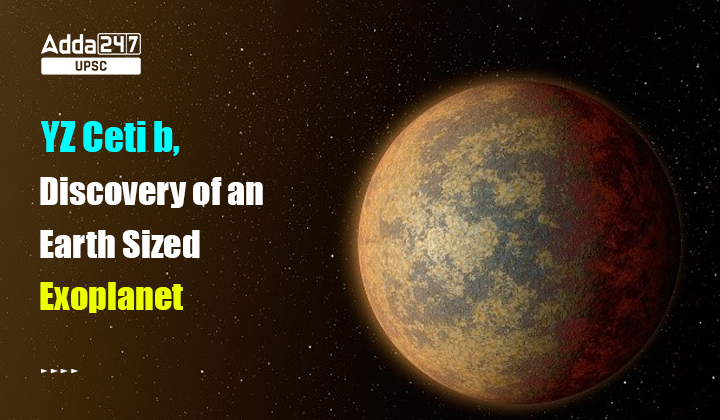Table of Contents
YZ Ceti b: YZ Ceti b is an exoplanet that orbits around the YZ Ceti star. It is a rocky, Earth-sized planet. YZ Ceti b is also important for UPSC Prelims Exam 2023 and UPSC Mains Exam (GS Paper 3- Science and Technology).
YZ Ceti b in News
According to astronomers, a recurring radio signal has been observed emanating from the exoplanet YZ Ceti b, indicating the presence of a magnetic field. This discovery suggests that YZ Ceti b may possess one of the fundamental conditions necessary for a planet to support life.
YZ Ceti b Details
YZ Ceti b orbits a small red dwarf star and is similar in size and composition to Earth, being a rocky exoplanet. Astronomers have recently turned their attention to YZ Ceti b, an extra-terrestrial planet located in close proximity to Earth, only 12 light-years away.
How YZ Ceti b Discovered?
The discovery YZ Ceti b of was made by Jackie Villadsen from Bucknell University, Pennsylvania, and Sebastian Pineda from the University of Colorado, Boulder, using the Karl G. Jansky Very Large Array radio telescope in New Mexico. They also published their findings in the journal Nature Astronomy.
- Detecting the radio signals emanating from the star YZ Ceti required the researchers to make several observations, during which they observed a correlation with the orbital period of YZ Ceti b.
- This led them to conclude that the signals were likely caused by the interaction between the exoplanet’s magnetic field and the star.
Role of Magnetic Field in Discovery of YZ Ceti b
Similar to how energy surges from the sun can disrupt satellite communications and damage orbiting satellites, intense energy bursts resulting from the interaction between the YZ Ceti star and its orbiting exoplanet create awe-inspiring auroral displays.
- Experts explained that the indirect evidence of these phenomena is observable through the radio emissions received on Earth.
- The detection of these radio waves, which are powerful enough to be detected on our planet, confirms the presence of a magnetic field surrounding the exoplanet.
- This phenomenon can only occur if the exoplanet is situated in close proximity to its parent star and has its magnetic field, which interacts with the star’s stellar wind and generates the radio signals.
Significance of YZ Ceti b Discovery
The exoplanet YZ Ceti b completes its orbit around its star in only a few Earth days, indicating a relatively small orbital distance. Since the 1990s, astronomers have identified numerous planets orbiting stars resembling our sun.
- For a planet to support an atmosphere and sustain water, it must be positioned at a certain distance from its star, also known as the “Goldilocks zone.”
- If a planet is too close to its star, it may become scorched, while being too far may leave it frozen like Mars.
- It is estimated that approximately 30% of all discovered star systems have the potential to host planets within their Goldilocks zones.
Importance of Magnetic Field
Given the high number of exoplanets discovered to date, it was reasonable to assume that many of these planets would have strong magnetic fields. However, despite the discovery of magnetic fields on several larger exoplanets, planetary scientists have not been able to detect such fields on smaller rocky exoplanets — until now.
- Pineda emphasized that if the new findings are validated through further research, it would confirm the effectiveness of their approach in characterizing the magnetic properties of exoplanets.
- This is significant because the presence or absence of a strong magnetic field is critical to a planet’s atmospheric survival. Such a field protects the atmosphere from being eroded by charged particles from the host star.
Way Forward
Interestingly, Mars shares a comparable history despite orbiting at a safe distance from the sun. Billions of years ago, both Earth and Mars were similar, boasting plentiful water and similar atmospheric conditions. However, while life thrived on one planet, the other grew cold and lost most of its atmosphere due to solar winds.
- Extended observations are crucial to validate these findings and further explore the characteristics of the radio signals.
- Nonetheless, one fact remains clear- these discoveries will allow astronomers to learn more about rocky planets that are revolving around their host stars in the farthest corners of the universe.
Solar System Definition, Planets, Order, Sun, Moon, Stars



 TSPSC Group 1 Question Paper 2024, Downl...
TSPSC Group 1 Question Paper 2024, Downl...
 TSPSC Group 1 Answer key 2024 Out, Downl...
TSPSC Group 1 Answer key 2024 Out, Downl...
 UPSC Prelims 2024 Question Paper, Downlo...
UPSC Prelims 2024 Question Paper, Downlo...





